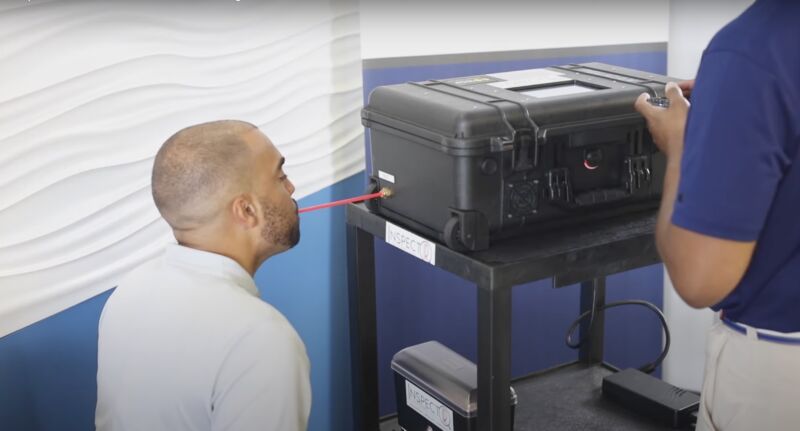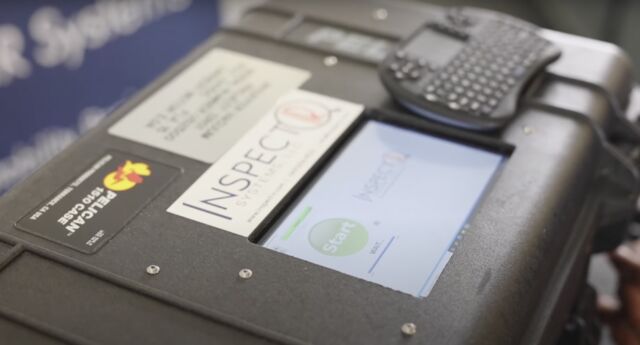
The Food and Drug Administration on Thursday announced the authorization of the first breath-based test for COVID-19.
The InspectIR COVID-19 Breathalyzer offers highly accurate test results in about three minutes, without the need for uncomfortable swabbing or collection of hazardous samples. But, before you get your hopes up for a handheld device you can huff into as you head out the door, it’s not quite that convenient. The test requires a high-tech device about the size of a carry-on suitcase—demo versions are literally housed in hard-shelled roll-aboard cases—and it requires a trained technician to operate. To take the test, a person has to sit next to the traveling instrument and blow into it through a straw for about 10 seconds.
The instrument inside the luggage is actually performing gas chromatography-mass spectrometry (GC-MS), which is a gold-standard analytical technique to finely separate out the components of a mixture. Generally, GC-MS samples are vaporized and mixed with an inert carrier gas before going through a capillary column, which separates out components by their boiling point and polarity. Then those components are ionized and fragmented and further separated out by their mass-to-charge ratios. The end readout is various peaks on a gas chromatogram, with each peak having a unique mass spectrum, allowing for the unambiguous identification of specific compounds.
For the COVID-19 breathalyzer test, InspectIR looks for the GC-MS signatures of five volatile organic compounds that are associated with a SARS-CoV-2 infection. The detection of these signatures has been shown to be highly accurate. According to the FDA, a study involving 2,409 people found that the device correctly identified 91 percent of known-positive samples as positive (test sensitivity) and correctly identified 99 percent of known-negative samples as negative (test specificity). The FDA also noted that known-positive samples came from people with and without COVID-19 symptoms and performed just as well in a follow-up study involving the omicron variant.
Exhalant results
In addition, the study showed that the test could produce reliable negative results in populations where infection rates are low. That is, in a population where only 4.2 percent of people were infected, the test had negative predictive value of nearly 97 percent. Although, the FDA cautions that “negative results should be considered in the context of a patient’s recent exposures, history, and the presence of clinical signs and symptoms consistent with COVID-19, as they do not rule out SARS-CoV-2 infection and should not be used as the sole basis for treatment or patient management decisions, including infection control decisions.”

The test’s maker, InspectIR Systems LLC, a Texas-based device company, expects the breathalyzer could be wheeled into doctors’ offices, hospitals, and mobile testing sites, where each instrument could perform around 160 tests per day. Because it heats and ionizes each breath sample, there’s no infectious or hazardous biological waste that requires device cleaning or disposal afterward. Test takers only need a single-use hygienic straw for sample submission.
But, it’s unlikely to be appearing at every corner pharmacy any time soon. InspectIR expects to be able to produce just about 100 instruments per week, the FDA notes. It’s also unclear how expensive each test will be at various sites.
Still, the portable, mini-GC-MS is an interesting—and potentially more accurate—rapid test for COVID-19 than the current antigen-based methods that are widely used.
The FDA’s authorization on Thursday “is yet another example of the rapid innovation occurring with diagnostic tests for COVID-19,” Jeff Shuren, director of the FDA’s Center for Devices and Radiological Health, said in a statement. “The FDA continues to support the development of novel COVID-19 tests with the goal of advancing technologies that can help address the current pandemic and better position the US for the next public health emergency.”
https://arstechnica.com/?p=1848407

